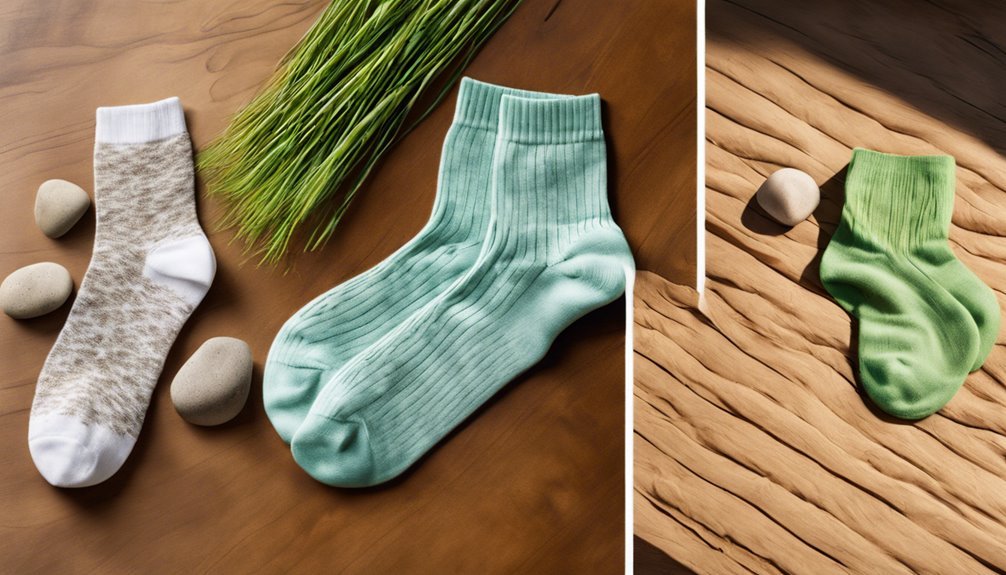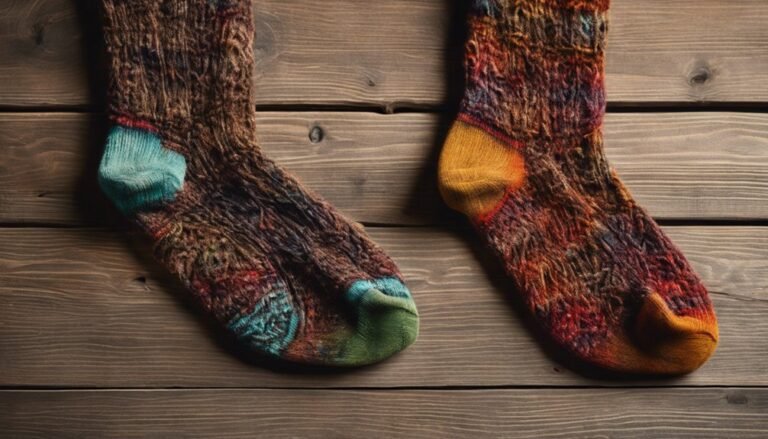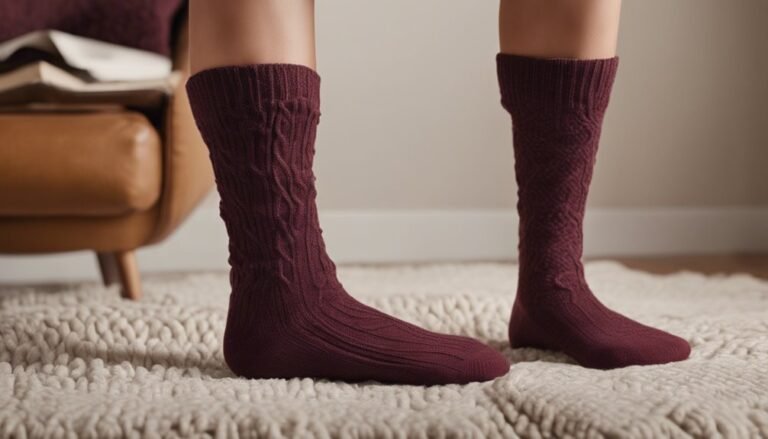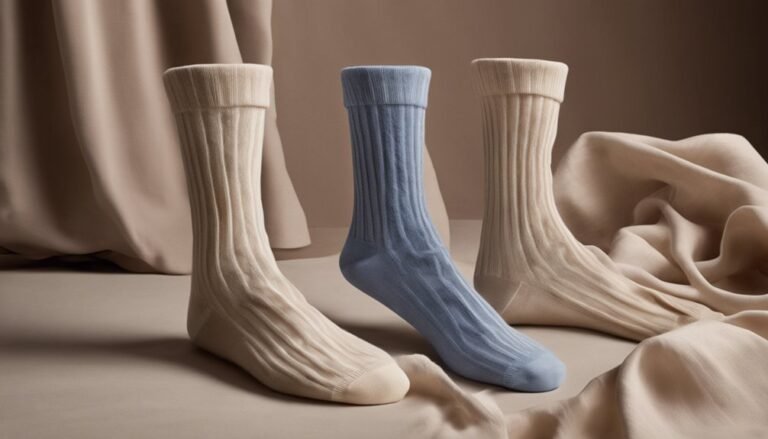Cotton Socks vs. Bamboo Socks: Which Is Better for Hot Weather?
When comparing cotton socks to bamboo socks for hot weather, bamboo typically wins out. Bamboo excels in breathability, allowing for better airflow and moisture-wicking properties, keeping your feet cooler and drier. Its natural antibacterial qualities help prevent odors, while cotton can contribute to a moist environment conducive to bacteria growth. Although durability is a consideration, the comfort and fit of bamboo socks may suit hot weather better. Discover more details about why bamboo might be your best option.
The Breathability Factor: Cotton vs. Bamboo
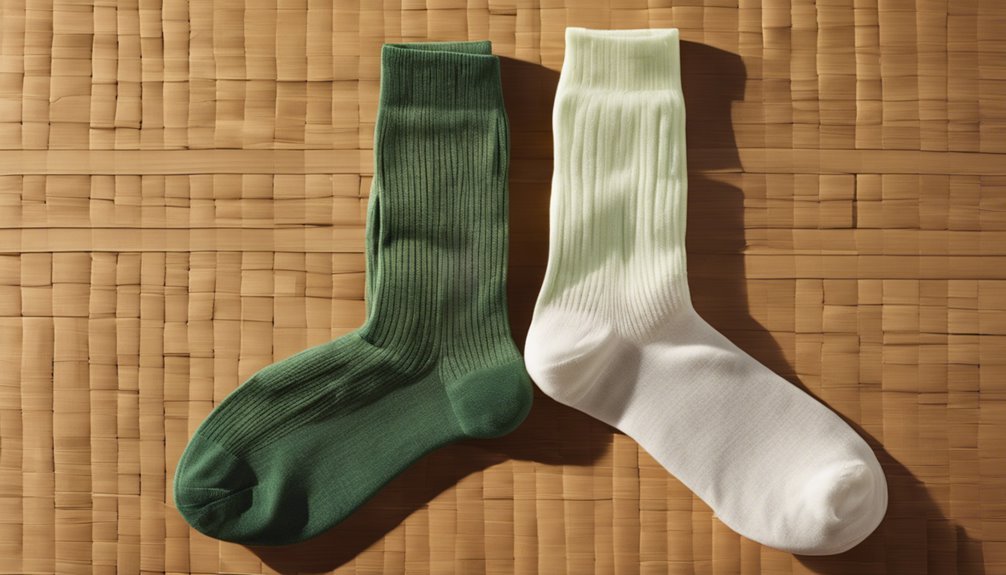
When it comes to breathability, the choice between cotton and bamboo socks can considerably impact your comfort. Cotton, a widely-used breathable fabric, allows air circulation but can retain heat, potentially leading to discomfort in warm conditions. In contrast, bamboo socks excel in temperature regulation due to their natural moisture-wicking properties and ability to maintain cooler temperatures. Bamboo fibers are structured to create microscopic gaps, enhancing airflow and promoting breathability. This means your feet stay cooler and more comfortable during hot weather. If you're seeking socks that provide ideal breathability, bamboo might be the superior choice. Ultimately, understanding these differences can empower you to make an informed decision, ensuring your feet remain comfortable and free during those warmer days.
Moisture-Wicking Properties: A Closer Look
While breathability plays a significant role in sock comfort, moisture-wicking properties are equally important in maintaining foot health and overall comfort. When it comes to hot weather, you want socks that can efficiently handle moisture absorption and enhance drying speed.
| Sock Type | Moisture Absorption | Drying Speed |
|---|---|---|
| Cotton | Moderate | Slow |
| Bamboo | High | Fast |
| Synthetic | High | Very Fast |
| Merino Wool | Moderate | Moderate |
| Blends | Variable | Variable |
Bamboo socks excel in moisture absorption and drying speed, making them a solid choice for hot climates. Conversely, cotton tends to retain moisture longer, which can lead to discomfort. Choose wisely for peak sock performance.
Antibacterial Qualities: Keeping Feet Fresh
Although foot odor is a common concern, particularly in warm conditions, the choice of sock material can greatly impact antibacterial effectiveness. Cotton socks may not offer significant antibacterial benefits, allowing bacteria to thrive and leading to unpleasant odors. Conversely, bamboo socks possess natural antibacterial properties that can enhance foot health by reducing odor-causing bacteria.
- Bamboo's antimicrobial qualities keep feet fresher longer.
- The hollow structure of bamboo fibers aids in moisture control, further minimizing bacterial growth.
- Bamboo socks are often softer, promoting comfort alongside their antibacterial benefits.
Durability and Longevity: Which Lasts Longer?
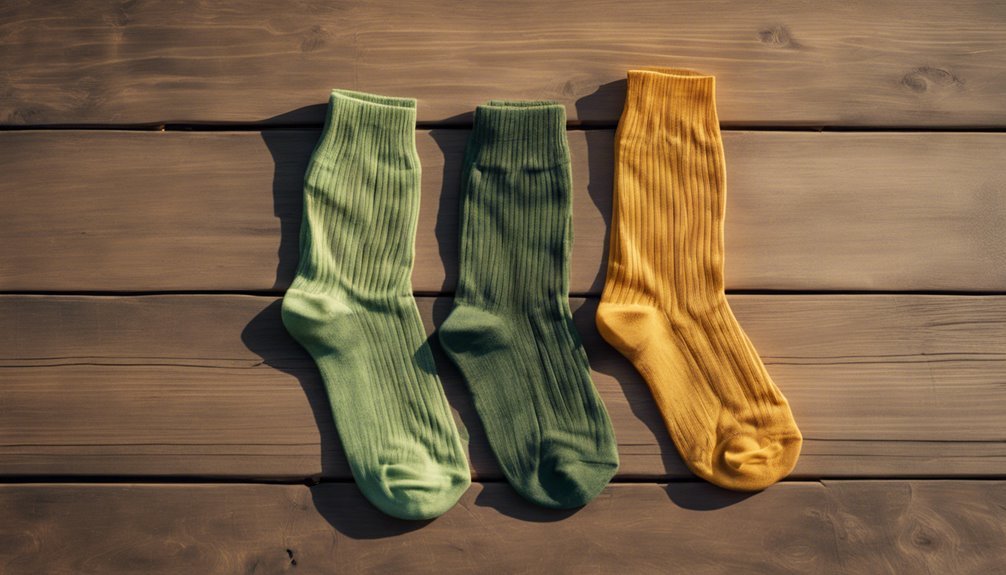
Durability is an essential factor to take into account when choosing between cotton and bamboo socks, as it directly affects their longevity and overall value. Cotton socks typically withstand frequent wear and washing, making them a reliable choice for daily use. However, bamboo socks, while softer, may not last as long under the same conditions.
In terms of sustainability impact, bamboo is often touted for its eco-friendly properties, but its durability may lead to a shorter lifespan compared to cotton. This can affect the cost comparison; you might find yourself replacing bamboo socks more frequently, negating any initial savings. Ultimately, considering both durability and the long-term sustainability impact is vital for making an informed decision that aligns with your values.
Comfort and Fit: Personal Preferences Matter
When it comes to comfort and fit, personal preferences play an essential role in your choice between cotton and bamboo socks. You'll want to reflect on how each material aligns with your personal style and accommodates your foot shape.
Here are some factors to contemplate:
- Breathability: Bamboo generally offers superior moisture-wicking, which can be important in hot weather.
- Stretch and Recovery: Cotton may stretch over time, while bamboo tends to retain its shape better.
- Softness: Bamboo is often softer against the skin, enhancing overall comfort.
Ultimately, the best sock for you hinges on how these attributes resonate with your individual needs, ensuring your feet stay comfortable and stylish throughout the day.
Frequently Asked Questions
Are Bamboo Socks More Environmentally Friendly Than Cotton Socks?
When considering whether bamboo socks are more environmentally friendly, you'll find their sustainability benefits often outweigh cotton's. Bamboo's manufacturing processes generally consume less water and chemicals, making it a greener choice for conscious consumers.
How Do Bamboo Socks Handle Odor Compared to Cotton Socks?
When you slip on socks, you expect comfort and freshness. Bamboo socks excel in odor control due to their moisture-wicking properties, helping keep feet dry and reducing bacteria growth, unlike cotton socks that may retain more odor.
Do Bamboo Socks Require Special Washing Instructions?
Bamboo socks don't require special washing instructions, but adopting gentle washing methods and fabric care enhances their longevity. Cold water and air drying are ideal, preserving elasticity while minimizing wear and tear over time.
Can People With Sensitive Skin Wear Bamboo Socks Comfortably?
Yes, if you've got sensitive skin, bamboo socks can be a great choice. Their natural softness and moisture-wicking properties provide comfort, while bamboo fabric advantages, like breathability, enhance your overall wearing experience.
What Are the Price Differences Between Cotton and Bamboo Socks?
When considering price comparison, bamboo socks typically range higher than cotton. A cost analysis reveals that while bamboo may offer superior qualities, it often comes at a premium, reflecting its sustainable production and benefits.

